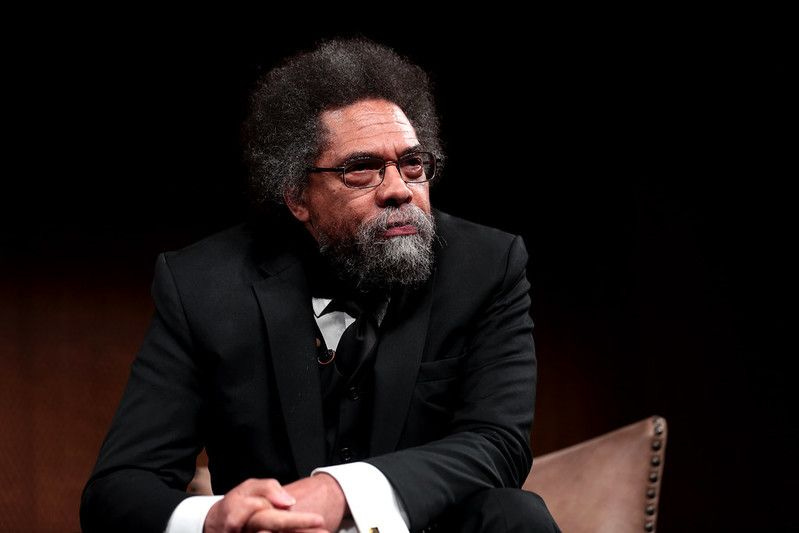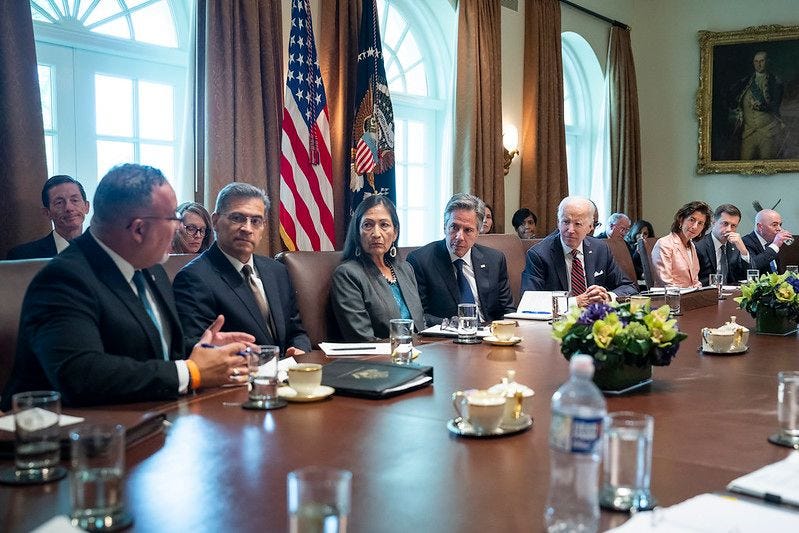Good morning! It’s Tuesday, June 6, 2023. The 2024 elections are 518 days away. If this newsletter was forwarded to you, subscribe here. If you want to contribute to support my work, donate here.
Before he was a podcaster, before he was #MeToo’d out of office, and before he was a senator, Al Franken wrote a bizarre and occasionally funny book, “Why Not Me?”
In the book, a fictionalized Franken runs for president on a single-issue platform — eliminating ATM fees — and eventually wins the White House, where he installs an all-Jewish cabinet and faces a Joint Congressional Committee to Investigate the President’s Mood Swings.
It is, of course, pure fantasy. But the titular phrase has been echoing in my ears this week as America gears up for the long-awaited (not really) presidential campaigns of former New Jersey Gov. Chris Christie, set to begin today in New Hampshire, and former Vice President Mike Pence and North Dakota Gov. Doug Burgum, both set to begin tomorrow.
After all, Burgum’s candidacy might not be as far-fetched as Franken’s anti-ATM crusade — but, honestly, it’s pretty close. With that in mind, you might be asking yourself: Why are all these people running for president if they have little to no chance of victory?
To which the answer is, Why not?
If you’re an ambitious politician with little to do — out of the vice presidency, say, or running a state the size of a single congressional district — there really isn’t much downside to launching a bid for the White House.
Consider the last contested presidential primary field, the 2020 Democrats, which happens to have been the largest in modern history, at 26 candidates. After running for president...
Kamala Harris notched a spot on the ticket. (Attn: Nikki Haley)
Pete Buttigieg scored a seat in the Cabinet. (Attn: Doug Burgum)
Bernie Sanders and Elizabeth Warren considerably expanded their influence in the Senate. (Attn: Tim Scott)
Tulsi Gabbard secured a cable TV talking-head contract. (Attn: Asa Hutchinson)
Andrew Yang received inordinate attention for his next long-shot project. (Attn: Vivek Ramaswamy)
Sure, running for president can take you away from your family for a few months and waste a bunch of other people’s money — but, if you play your cards right, it can also lead to an influx of cash and a rush of renewed relevance for yourself, in the form of a book deal or cable news sinecure, or, for the lucky few, a Cabinet spot.
People come to hear you speak. Your words become headlines. CNN might give you a town hall. And you might just land enough jabs on the debate stage to climb your way out of obscurity and trade up to an administration posting, a la Buttigieg going from an anonymous mayorship to stewardship of your rival’s main domestic priority. What more could an attention-hungry, out-of-office politician want?
One counterpoint from the 2020 race: Julián Castro, who got crosswise with the eventual nominee one too many times and landed himself in Democratic Party Sibera. (Not even a speaking slot at the convention! Ron DeSantis, beware.) For the most part, though, pure upside.
And then, of course, there’s the biggest potential upside of all: Maybe, just maybe, it’ll work out! Worst case scenario, no one ever hears of you. Best case scenario, you’ll spend the next four years crisscrossing the country on Air Force One and being serenaded by the Marine Corps Band every time you enter a room.
Is this a possibility for the Pence-Christie-Burgum set? Here’s the two-step theory of the case:
Step 1: Donald Trump crumbles, perhaps because of an additional indictment or possibly a health challenge.
Step 2: Whether because of his inability to schmooze or his too-online campaign, Ron DeSantis no longer looks like the obvious non-Trump alternative.
Suddenly, in this hypothetical, a void appears. The one problem: there’s no evidence Republican primary voters have any interest in turning to this week’s new entries to fill that possible void. In fact, it appears they are the last candidates the GOP electorate has in mind.
A recent Monmouth poll found that Pence and Christie have the highest unfavorability ratings of any GOP contenders; according to a CNN poll, 45% of Republicans would not consider supporting Pence “under any circumstances.” 60% said the same about Christie. (There is no available polling on Burgum, although it should be noted that he’s the second-wealthiest U.S. governor; his $1.1 billion net worth, derived from his time as a tech executive, could be good for a few ad campaigns to at least boost his name ID into single-digit territory.)
The reason why Pence and Christie stand out in Republican voters’ minds as uniquely distasteful isn’t hard to deduce: they are arguably the two Republican candidates most identified with crossing Donald Trump. Candidates like Ron DeSantis, who has been stepping up his Trump criticism but remains identified with Trump’s political style, do not face the same reproach. In the Monmouth poll, despite facing a string of recent attacks, DeSantis’ favorability rating of 73% is second only to Trump’s 77%.
These numbers show that, even in the event that Step One of my hypothetical above (Trump crumbling) pans out, there are still some ways to go for Step Two (DeSantis following) to materialize. Even if Trump falls, Trumpism — with DeSantis as its closest avatar — would still be poised to carry the day.
It’s a good thing the candidates counting on that hypothetical don’t have much to lose.
Two more notes
Much of what I wrote above — an also-ran campaign for president can be worth it as a great way to get attention — is conditioned on making it to the debate stage. (This appears particularly true for the famously pugilistic Christie.) However, the RNC announced its debate criteria last week: to qualify, unlike the 2020 Democrats, candidates will have to meet both a polling and fundraising threshold that neither Pence nor Christie are guaranteed to meet.
Of course, while running for president almost only comes with upside for the candidates themselves, a crowded field can bring plenty of downside for the party (to the extent the party wants to move on from Trump), as it splits the non-Trump vote. (See: “The GOP’s collective action problem.”) One Republican pol who seems to have grokked that: New Hampshire Gov. Chirs Sununu, who surprised some observers by announcing Monday that he won’t run for president. “We must not be complacent, and candidates should not get into this race to further a vanity campaign, to sell books or to audition to serve as Donald Trump’s vice president,” he wrote. Much like Scott Walker’s similar warning in 2016, the message appears to be falling on deaf ears.
More news you should know
THIRD PARTY: Progressive activist and scholar Cornel West launched a presidential campaign on Monday as a candidate of the People’s Party.
TRUMP PROBES: A trio of lawyers representing Donald Trump met with special counsel Jack Smith at the Justice Department on Monday amid reports that Smith’s investigation into Trump’s handling of classified documents is nearing its conclusion.
Related: “Mar-a-Lago pool flood raises suspicions among prosecutors in Trump classified documents case” (CNN)
BIDEN PROBES: “The FBI and Justice Department under then-Attorney General William P. Barr reviewed allegations from a confidential informant about Joe Biden and his family, and they determined there were no grounds for further investigative steps, according to Rep. Jamie Raskin (D-Md.) and other people familiar with the investigation.” (WaPo)
IN UKRAINE: “Ukraine on Tuesday accused Russian forces of blowing up a major Soviet-era dam and hydroelectric power station in a part of southern Ukraine that Russia controls, sending water gushing from the breached facility and risking massive flooding. Ukrainian authorities ordered thousands of residents downriver to evacuate.” (CBS)
Today’s political planner
President Biden will hold a Cabinet meeting, his first since January.
Vice President Harris will travel to Philadelphia to hold an event with the Service Employees International Union (SEIU). When she returns, she will attend the Cabinet meeting and deliver remarks at a reception marking the 75th anniversary of Israel’s founding.
The Senate will hold a procedural vote on an Energy Department nominee.
The House will begin consideration of the Gas Stove Protection and Freedom Act, which would prohibit a federal ban on gas stoves.
The Supreme Court has nothing on its schedule.
Thanks for reading.
I get up each morning to write Wake Up To Politics because I’m committed to offering an independent and reliable news source that helps you navigate our political system and understand what’s going on in government.
The newsletter is completely free and ad-free — but if you appreciate the work that goes into it, here’s how you can help:
Donate to support my work or set up a recurring donation (akin to a regular subscription to another news outlet).
Buy some WUTP merchandise to show off your support (and score a cool mug or hoodie in the process!)
Tell your family, friends, and colleagues to sign up at wakeuptopolitics.com. Every forward helps!
If you have any questions or feedback, feel free to email me: my inbox is always open.
Thanks so much for waking up to politics! Have a great day.
— Gabe







